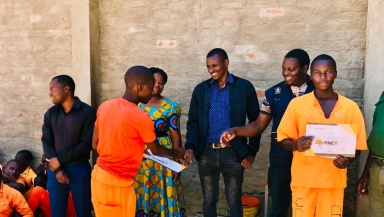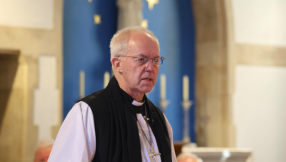
When I walk into a prison now, it’s by choice — and by calling. I’m the founder and Executive Director of Prison Outreach Support Zimbabwe, also known as Prison Fellowship Zimbabwe, and my team and I lead programmes that are transforming the lives of prisoners and their families across our country. But over a decade ago, I walked into prison as an inmate — convicted of a crime I didn’t commit.
In 2005, I was studying at Bible college and leading the children’s ministry at my local church. I loved it. But my relationship with another staff member became difficult. I received more financial support than they did, and that caused resentment and jealousy. They became determined to disqualify me from ministry and remove me from the church. They created a lie and accused me of a crime I did not commit.
The police came to my college and arrested me in front of all the other students, a deeply humiliating and frightening experience. They questioned me and took a statement, but I had no idea how to defend myself. This was the first time something like this had happened to me.
The trial process dragged on for three years, but thankfully, I was granted bail and able to continue my studies while waiting for the outcome. I graduated from college on 3 April 2008. The very next day I was convicted and sent to prison.
It was like I graduated for prison.
I served six months in prison. I knew I was innocent, and I held onto God during this time. In the midst of the confusion and hardship, I was so convinced that God must be doing something positive in my life.
Some of my college tutors prayed for me while I was in prison, and it was then that I met Prison Fellowship Zimbabwe and gradually began to see, and, experience for myself, the impact of their life-changing work.
At that time, the work was led by Peter Mandianike. He preached to us, and I began to get involved and help out. We taught other prisoners the principles of the Bible, how to understand it and how to apply it to their lives.
I was so active in the group that some of the prison officers began to say, “I don't think you are here for no reason. I think God is trying to send you a message.” And that's when I started to understand that God may be calling me to work in prisons.
After six months behind bars, my appeal was successful. I was exonerated and freed.
Since then, I’ve given my life to prison ministry. Today, we run Prison Fellowship International programmes such as The Prisoner’s Journey, reaching prisoners in more than 30 prisons, and PromisePath serving the families of nearly 400 children of prisoners. We also train volunteers, partner with churches and advocate for justice and restoration nationally.
For me, this isn’t just a job. It’s personal. I’ve seen God’s power to bring purpose out of pain.
One story I’ll never forget is of twin girls I met when they were just six years old. As their father was in prison, we enrolled them into PromisePath and provided them with school fees, mentorship and connection with a local church. Now, they are thriving. One of them is studying urban science at university and the other is at technical college studying food science.
That’s what restoration looks like. It’s why I do what I do.
We still face challenges — government policies shift, resources are limited and provinces operate differently. But we keep going because we’ve seen what’s possible.
Not long ago, children in Zimbabwe weren’t allowed to visit their incarcerated parents. But through our advocacy, the government introduced “Prison Family Week,” a chance for families to come together, perhaps for the first time in years, to talk and rebuild their relationships. It is changing lives.
For me, being a prisoner changed how I see the Bible, too. I now realise that the Bible is a book about prisoners and their release. It’s the story of God reaching out to restore people who have sinned, who are broken and who have lost their way. Jesus himself was arrested. He was tried, mocked and imprisoned. He died a criminal’s death.
Going to prison broke me. But it also built me up to be the man I am now. And by God’s grace, it’s building others too.
Wilson Femayi is Executive Director of the Prison Fellowship Zimbabwe. To learn more about Prison Fellowship International’s global network of National Ministries, like Prison Fellowship Zimbabwe, and the programs they run across the world, like The Prisoner’s Journey and PromisePath, visit: https://pfi.org/.













